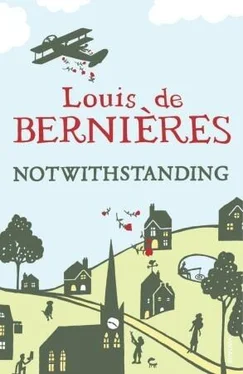The Colonel, fearless in the face of terrorists, bullets, burglars and high-explosive shells, was readily defeated by a woman’s tears, and so Anna stayed on, romantically and absent-mindedly caressing the ornaments with a duster, her gestures curtailed and curiously melodramatic. She was a relentless furnisher of cups of tea, made in the British Army style with condensed milk and heaps of white sugar, and she seldom spoke except to exclaim ‘ Gott im Himmel ’ or ‘Ach , du meine Güte ’.
Naturally she understood English perfectly, but what few words emerged were cloaked in an accent thick with years of linguistic apathy. She lived in the attic, which had been converted into an upper room, and there she played with her hair in front of a mirror and hugged her breasts to herself while singing snatches of nursery songs whose words she had muddled up over the passage of the years. The Colonel had a theory that she had been interfered with by the advancing Mongolian hordes in Berlin in 1945, and that this explained her tenuous grip on reality and the skewed angles of her psyche.
Anna never went out, and never spent her exiguous wages. Under her bed she kept rows of jam jars full of the obsolete pre-decimal coinage of her first years with the family and in others she kept all the notes that she had ever earned, with the intention that when she died all the money they had ever paid her would revert to them. Anna, because she had been a nanny, was, of course, known to the entire family as ‘Nanna’, and she had never once expressed a wish to return to Germany, even out of curiosity.
The cat, the final member of the household, was named Troodos because Mrs Leafy Barkwell had so much enjoyed being stationed in Cyprus, until Makarios and Grivas between them had turned their pleasant existence into a nightmare. Troodos was a genial tabby of about six years, with green eyes and an unappeasable appetite for voles. Most cats disdain them for their bitter taste, but Troodos would sit for hours in the long grass, waiting for a blade to stir. He could leap twelve feet or more, and land on the rustling object with perfect precision. He would swallow them head first, much as a snake does, bolting them down in great gulps. If he caught too many to eat he would bring them in and lay them down in rows on the carpet, much as the moleman’s cat, Sergeant Corker, did with his moles.
It happened that one day Colonel and Mrs Barkwell were preparing a dinner party for a few friends, while Nanna polished the banister ball. She liked it to be shiny because it reminded her of the round head and glistening brown hair of the Barkwells’ youngest daughter.
Mrs Barkwell had bought a large salmon which she was intending to poach in a steel fish kettle, and was looking over the Colonel’s shoulder as he gutted and cleaned it. ‘Whopper,’ he commented. ‘Tough one to land.’
‘Oh dear,’ worried Mrs Barkwell. ‘Do you think it’s all right?’
‘Tickety-boo,’ said the Colonel.
‘You know, I do think it might be a bit off. Oh Lord. What do you think, Perry?’
The Colonel lowered a reconnoitring proboscis, and sniffed. ‘Smells of fish,’ he declared. ‘What d’you expect?’
Mrs Barkwell was still worried. ‘You don’t think it’s a bit ripe? I mean, wouldn’t it be awful if we made everyone ill?’
‘Folderol,’ said the Colonel. ‘Perfectly good fish.’
‘Nanna,’ called Mrs Barkwell, ‘do come and smell this fish; I think it might be off.’
Nanna came into the kitchen and poked the flank of the salmon. Then she sniffed her finger, first with one nostril, and then the other. She wiped it on her apron, and said, with a connoisseur’s air of finality, ‘ Weiss nicht. Entschuldigung ’.
‘I’ve eaten pheasant so high, maggots in it,’ declared the Colonel. ‘No harm done.’
‘Pheasant’s different, Perry dear, fish has to be fresh,’ said his wife.
‘Portugal,’ said the Colonel, ‘ bacalao . Months old. India, Bombay duck, years old. Prehistoric.’
‘Years old, and dried and salted,’ rejoined Mrs Barkwell. ‘This is supposed to be fresh from the lochs.’
‘Cat,’ suggested the Colonel.
Mrs Barkwell raised a finger and touched him on the tip of his nose. ‘Clever boy,’ she said.
Troodos was accordingly summoned from the orchard by the vigorous rattling of his biscuit box. There had not been much action on the vole front, and he was certainly ready to try the fish. He was so fussy about his food that in the evening he would not even eat from a tin that had been opened that morning, and Perry and Leafy Barkwell placed great faith in his gastronomic expertise.
Nanna, the Colonel and Mrs Barkwell bent over and watched Troodos contentedly polishing off a lump that Leafy had cut out of the side that was to be downward on the serving dish. ‘ Er schnurrt ,’ observed Nanna, and the other two listened with satisfaction as Troodos accomplished the daily miracle of purring and eating at the same time.
‘Well, pussy likes it,’ said Mrs Barkwell, and the Colonel patted Troodos somewhat brusquely on the head, saying, ‘Good soldier, what? First class, first class.’
The salmon was duly poached. All the same Mrs Barkwell could not help but wonder whether or not the fish really was all right. She had sown a doubt in her own mind that was very hard to uproot, and this doubt also began to infect the Colonel, despite his implicit trust in the cat’s considered judgement. ‘Crossed fingers, what?’ he said to his wife.
Sir Edward and Lady Rawcutt had cried off, but the Rector, Polly Wantage and her artist friend, and Joan and the Major turned up at eight as planned. ‘Slight worry about the fish,’ the Colonel informed them as they sat down. ‘Hope it’s all right. Should be. In fact, damned sure it is. Tried it on the cat. Can’t fool the cat.’
‘Please leave it if you have any doubts,’ said Mrs Barkwell. ‘There’s plenty of everything else. I won’t be at all offended.’
‘All the more for puss, eh?’ said the Colonel.
‘One has to be so careful of salmonella, these days,’ said Polly Wantage’s artistic friend, oblivious to the pun. ‘And wisteria.’
The Colonel regarded her incredulously; he had always thought her a little ill-connected in the brain department, a typical airy-fairy artist type, in fact. ‘Wisteria is a card game,’ he told her, ‘listeria’s the one.’
‘Whist is the card game, I think you’ll find,’ offered the Reverend Godfrey Freemantle, diffidently. ‘Wisteria is a climbing plant, floribunda, formosa, sinensis, venusta …’ Here he caught the Colonel’s hostile eye, and added, ‘But, of course, as Perry says, it is indeed listeria that causes gippy tummy.’ Once more he smiled at the Colonel, who was notoriously irked by being corrected, and who, on account of just this very flaw, had once narrowly missed the opportunity of being made equerry to the Queen.
The guests tucked into their fish, and declared it perfect, wonderful, superb, just right, and the best they had ever had. But the sorry fact was that Colonel and Mrs Barkwell had managed all the same to insinuate doubt into their guests’ minds as well. ‘It would have been better not to have said anything at all,’ reflected Leafy Barkwell, as she surveyed the mildly worried expressions upon their faces.
The Rector had a second helping, motivated by Christian supportiveness, explicitly putting his trust in God by means of a fleeting supplication, and the Major had seconds because, as he put it, ‘In my time I’ve drunk water from a petrol can, and I’ve cooked fried eggs on the bare metal of an armoured car in the middle of the desert, and I’m damned if anything will ever make me ill again.’ He ate his second helping as a direct personal challenge to the fish, and to any and all bacilli that it might contain. Joan, his wife, who had heard this speech about petrol cans and fried eggs a hundred times, loyally corroborated the Major’s assertions. ‘Oh yes,’ she said, ‘the Major’s never ill. It’s positively alarming what his stomach can put up with.’
Читать дальше












